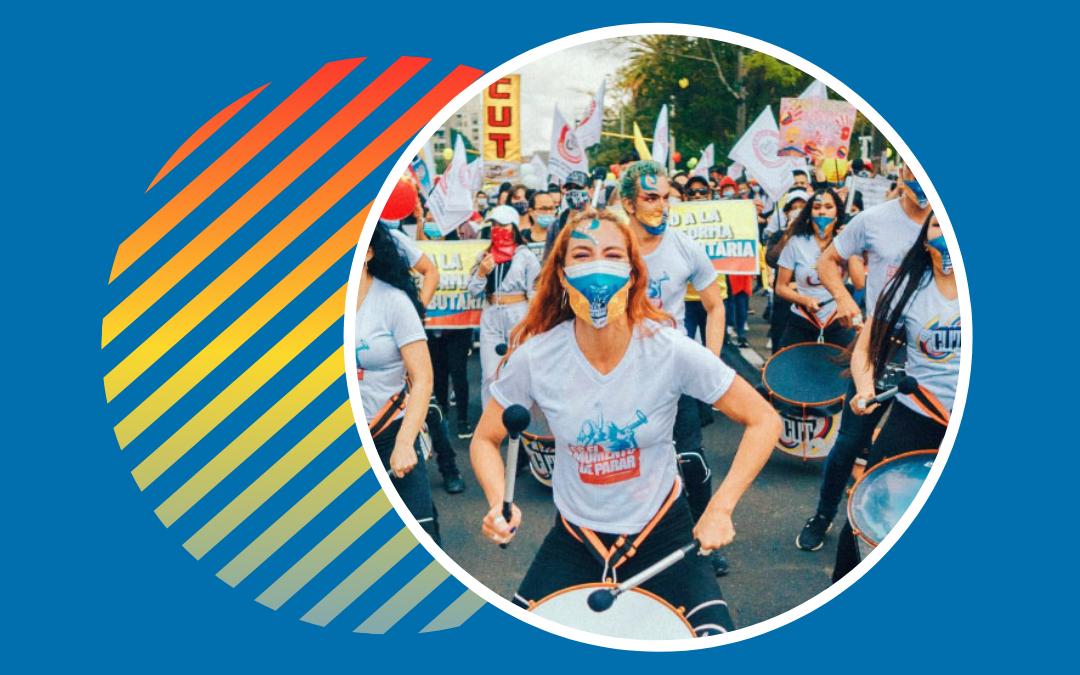
Nov 3, 2021
Police violence, which escalated during COVID-19, is part of a rising tide of global crackdowns targeting marginalized communities, workers and young people struggling to support themselves. The latest episode of The Solidarity Center Podcast looks at how workers in Colombia and Nigeria—targeted by police brutality as they staged peaceful protests to address inequality—are joining and leading large movements to demand new levels of accountability from and reform of the authorities charged with protecting and serving their communities.
Podcast host and Solidarity Center Executive Director Shawna Bader-Blau talks with Francisco Maltés, president of the Unitary Workers Center (CUT) in Colombia, and Gbenga, general secretary and founder of the Federation of Informal Workers’ Organizations of Nigeria. They describe how workers, especially those living most on the edge, are taking back their communities by standing up for justice and opposing decades of widespread, systemic corruption that feeds off state-sponsored violence.
“Justice and police activity in Colombia can be characterized as being directed at poor people,” says Maltés. “The National Strike Committee has proposed a bill for reforming the national police force.”
Catch More from Season Two!
Listen to this and all Solidarity Center episodes here or at Spotify, Amazon, Stitcher, Castbox or wherever you subscribe to your favorite podcasts.
Catch recent Season Two episodes:
The Solidarity Center Podcast, “Billions of Us, One Just Future,” highlights conversations with workers (and other smart people) worldwide shaping the workplace for the better.
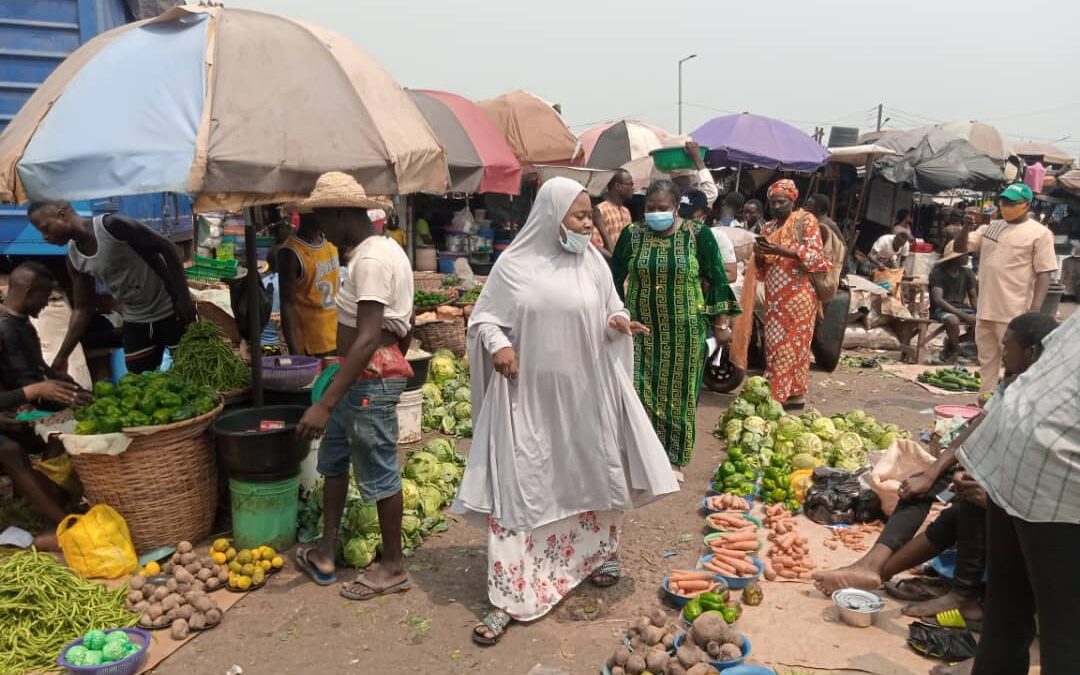
Nov 1, 2021
A magistrate court in Nigeria this week recommended prosecution of a man accused of sexually assaulting a minor in a bustling Lagos open marketplace—and gender rights activists there say the move was the direct result of awareness training conducted with market vendors about their right to violence-free workplaces. Nasiru Umaru, 44, is now in KiriKiri correctional center. The girl was helping her mother make extra money by selling goods, as do many children forced to work in hazardous environments to ensure their families make enough to meet basic needs.
Bringing a case like this is rare in the market, says Onyeisi Chiemeke, an attorney with International Lawyers Assisting Workers network (ILAW), which is aiding with the prosecution. Chiemeke says a newly formed gender-based violence task force in the market brought attention to the alleged rape, and the case now goes to trial in Nigeria’s high court. ILAW, a project established in 2018 by the Solidarity Center, is the largest global network of workers’ rights lawyers and advocates.
Building Synergies to Fight Violence and Harassment
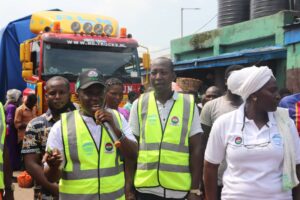
Amina Awal, Hausa language GBVH educator trainer, reaches out to workers in the Mile 12 Lagos market truck park. Credit: Solidarity Center / Nkechi Odinukwe
Following the 2019 adoption of Convention 190 at the International Labor Organization (ILO), union leaders at the Nigeria Labor Congress (NLC), together with the Solidarity Center, began training workers, seeking to put into practice C190’s extensive provisions on preventing and ending gender-based violence and harassment (GBVH) in the world of work.
“I think we are making a lot of progress, a lot of awareness,” says Rita Goyit, head of the NLC’s Department of Women and Youth and secretary of the NLC National Women Commission.
Mile 12 market vendors who took part in the training quickly formed a GBVH task force that worked with the NLC to develop a market code of conduct covering gender-based violence and harassment. The vendors also posted suggestion boxes for reporting GBVH, and the NLC’s Lagos State union chapter leader monitors the submissions and alerts the NLC when necessary.
Vendors also are creating posters to spread awareness and talking with other sellers at the vast, sprawling market, where thousands of people visit each day to buy vegetables, legumes and other food items.
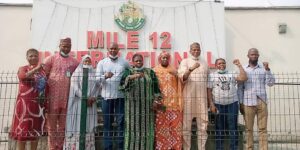
NLC and market leaders at the Mile 12 market in Lagos partnered to raise awareness about gender-based violence and harassment at work. Courtesy: NLC
Key to the success of the trainings, says Goyit, is that they were held in local languages. “That was one of the strategies that really worked—it was a language they understood. People talked one-on-one in the local language.” Vendors from across Nigeria travel to Mile 12, the largest in Lagos, to sell their wares.
The NLC also is joining with unions and allied organizations in urging the government ratify C190. Ratifying an ILO convention signifies a country’s intention to be bound by its terms. Union activists worldwide are campaigning for its ratification, and nine countries have done so.
As the accused man awaits a court hearing, Chiemeke says the synergy between market vendors and lawyers is helping make concrete the rights that Convention 190 provides to violence-free environments.
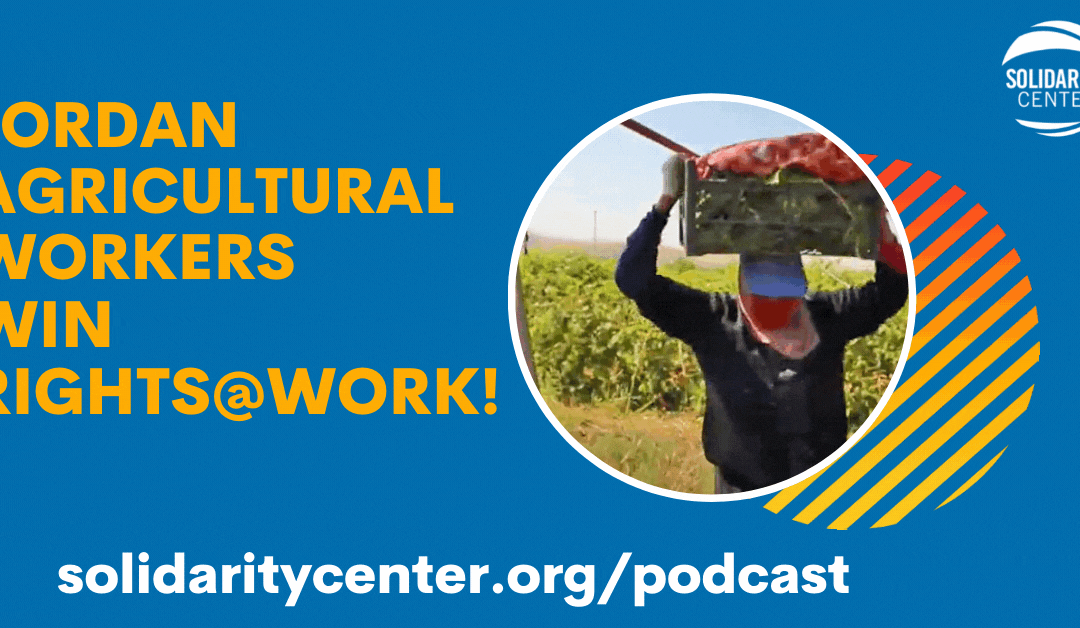
Oct 20, 2021
Some of the most essential workers are also among the most overlooked—the women and men who plant, harvest and transport our fruits and vegetables, ensuring our tables are full every day, and especially during the COVID-19 pandemic.
Worldwide, they also are among workers with the fewest legal protections and rights on the job. On the latest Solidarity Center Podcast, Hamada Abu Nijmeh describes how agricultural workers in Jordan collectively campaigned for—and won—a landmark law that will bring them safer jobs, overtime pay, 14 days annual paid leave and 14 days paid sick leave.
The workers, the majority of whom are women, also won 10 weeks paid maternity leave. Significantly, the legislation also covers migrant agricultural workers, who frequently are not protected by countries’ labor laws.
Abu Nijmeh is director of the Jordan-based Workers’ House for Studies, and with the Agricultural Workers Union, led the campaign for this first-ever legislation.
“So I can proudly say that it is through the efforts of many that we have been able to achieve this landmark achievement,” says Abu Nijmeh. “I can say without a doubt that this is a historic achievement because since Jordan was founded, agricultural workers have not been included in the labor law until now.”
Agricultural workers won this victory despite the legally limited ability of all workers to form unions in Jordan, says Abu Nijmeh. He tells Solidarity Center Podcast host Shawna Bader-Blau that the union’s next steps include winning the fundamental right for workers to freely form unions and bargain collectively.
“The trade union of agricultural workers tried to register [with the government] and, of course, they have been denied and they took it to court,” he says. “The best way to protect the agriculture sector and any future trade union in the agricultural sector is to fix the problem with the entire system.”
Listen to This & All Solidarity Center Episodes
Listen to this and all Solidarity Center episodes here or at iTunes, Spotify, Amazon, Stitcher, Castbox or wherever you subscribe to your podcasts.
The Solidarity Center Podcast, “Billions of Us, One Just Future,” highlights conversations with workers (and other smart people) worldwide shaping the workplace for the better.
Check out recent episodes of The Solidarity Center Podcast.
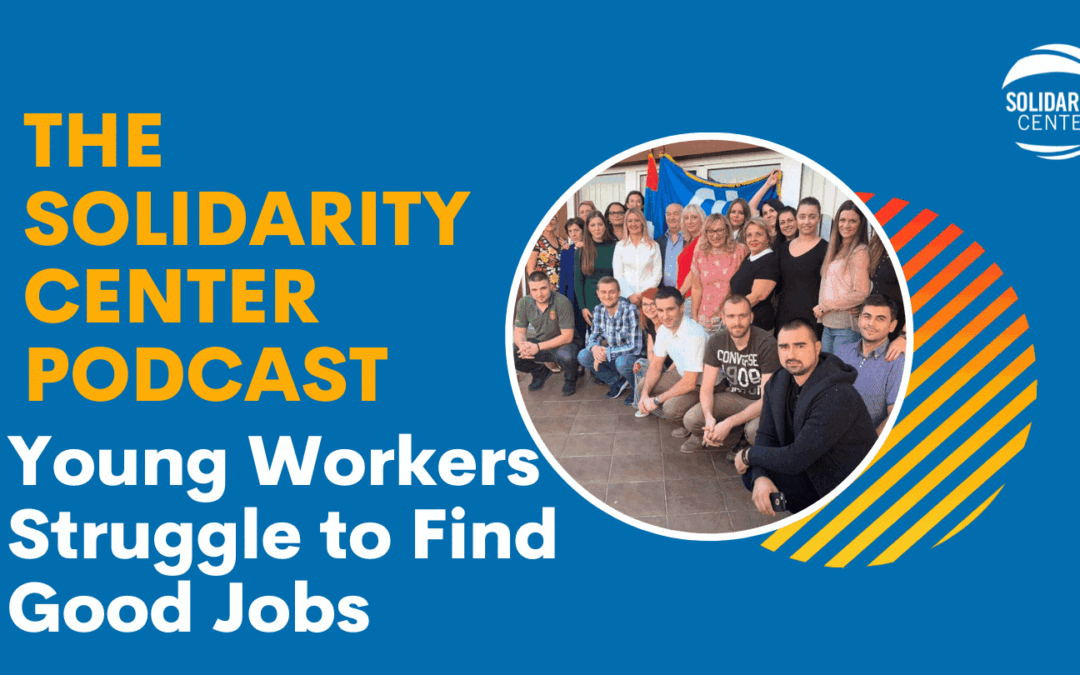
Oct 13, 2021
Around the world, young people with few job options are forced to take whatever work they can find, no matter how low the pay or insecure the work. Many sign on with platform-based jobs to get by. Others leave their country with the hope of finding decent, secure work elsewhere, looking for a chance to fairly compete on a level playing field.
The latest Solidarity Center Podcast takes a look at what’s happening in Serbia, where one in four young people are not employed and not in school, and how unions there are meeting the challenges.
“The number one issue for all countries in the region and all young people is decent employment and the potential to find a job for each person in a way that is transparent and efficient and without corruption,” says Bojana Bijelovic Bosanac, a political scientist and expert adviser in the International Department at Confederation of Autonomous Trade Unions of Serbia (CATUS).
Bosanac tells Solidarity Center Executive Director and podcast host Shawna Bader-Blau about a union-lead survey among young workers in the Balkan region during the pandemic in which many reported being unpaid for their platform work as programmers, customer service reps, telecenter workers and delivery drivers, with nowhere to turn for support. Making the union their home is a key goal for CATUS and unions across Serbia.
“When we talk to young people, we want them to know that they are part of the union. They are the future of the union. We are inviting them always to approach, to come, to participate and to be leaders of the union.”
The Solidarity Podcast Available Wherever You Get Podcasts
Listen to this and all Solidarity Center episodes here or at iTunes, Spotify, Amazon, Stitcher, Castbox or wherever you subscribe to your podcasts.
The Solidarity Center Podcast, “Billions of Us, One Just Future,” highlights conversations with workers (and other smart people) worldwide shaping the workplace for the better.
Check out recent episodes of The Solidarity Center Podcast.
This podcast was made possible by the Ford Foundation and the generous support of the American people through the U.S. Agency for International Development (USAID) under Cooperative Agreement No.AID-OAA-L-16-00001 and the opinions expressed herein are those of the participant(s) and do not necessarily reflect the views of USAID/USG.
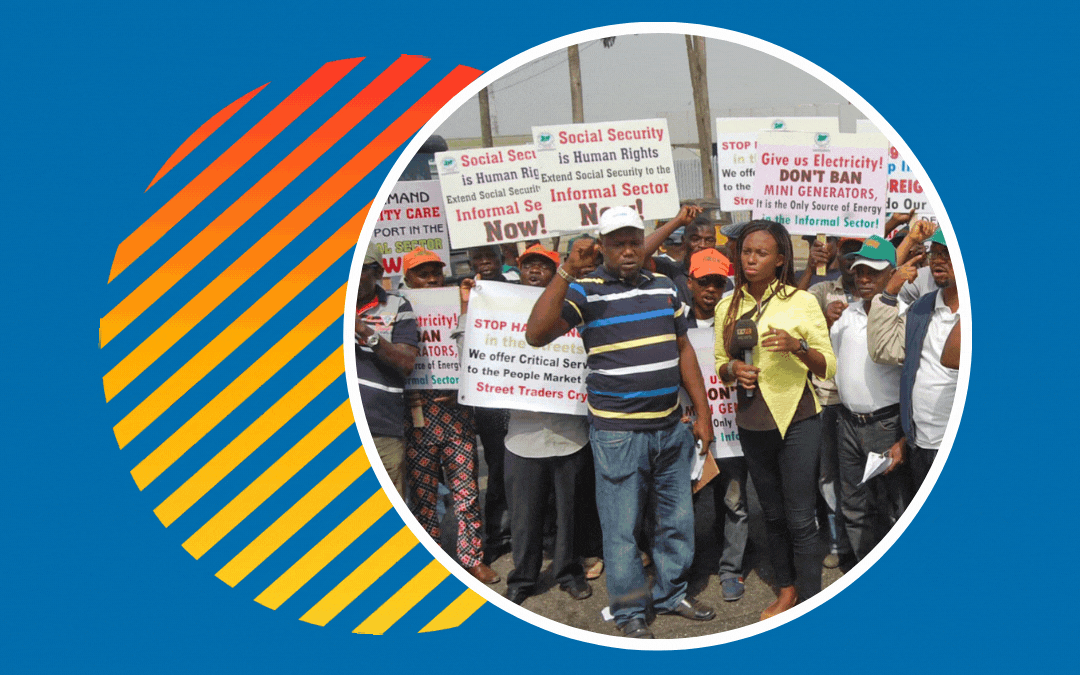
Oct 6, 2021
Worldwide, 2 billion workers perform essential work selling goods in street markets, driving taxis or cleaning homes. The vast majority of these jobs are low wage, with no security and no paid sick leave or health care.
In Nigeria, where more than 80 percent of the population works in informal economy jobs, these workers are joining together to fight for their right to decent work through the Federation of Informal Workers’ Organizations of Nigeria (FIWON), a nationwide association with hundreds of branches across the country.
On the first Solidarity Center Podcast this season, Solidarity Center Executive Director and podcast host Shawna Bader-Blau talks with Gbenga, FIWON founder and general secretary. Gbenga describes how informal economy workers are using their collective power, building coalitions with allied organizations and making key gains, like ending evictions during the COVID-19 pandemic, addressing unfair, burdensome taxation on vendors and, importantly, winning recognition by government and society that they must have the same rights and respect as all workers.
“Poor working people must have access to basic social security, but it doesn’t start with that,” says Gbenga, who goes by one name. “It starts with even the right to work without fear. The right to work without harassment and unnecessary molestation. The right to access public spaces as commonwealth, as something that belongs to all of us.”
Tune In to The Solidarity Center Podcast!
Listen to this and all Solidarity Center episodes here or at iTunes, Spotify, Amazon, Stitcher, Castbox or wherever you subscribe to your podcasts.
The Solidarity Center Podcast, “Billions of Us, One Just Future,” highlights conversations with workers (and other smart people) worldwide shaping the workplace for the better.
Check out recent episodes of The Solidarity Center Podcast.
This podcast was made possible by the Ford Foundation and the generous support of the American people through the U.S. Agency for International Development (USAID) under Cooperative Agreement No.AID-OAA-L-16-00001 and the opinions expressed herein are those of the participant(s) and do not necessarily reflect the views of USAID/USG.







